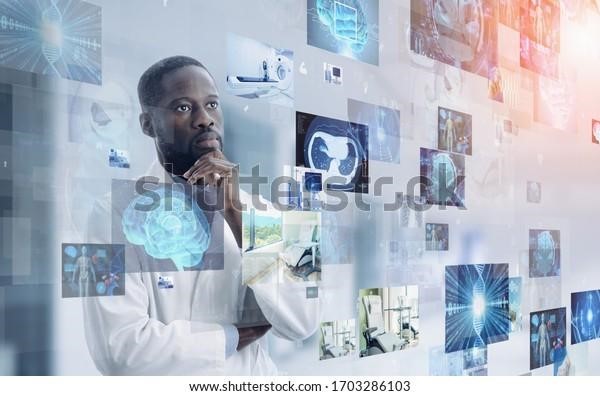Technology has been improving rapidly, and this has had major impacts on medical care and patient outcomes. Technology in the healthcare industry has become such a dominant force that most tech companies and developers refer to it as MedTech.
Technically, the term MedTech can refer to a wide range of medical advancements. For example, eyeglasses can be considered MedTech. However, for our purposes, when we use the term MedTech in this piece, we refer to digital solutions like apps and custom-built software.
You might be surprised to learn how much impact MedTech software can have on patient care and healthcare industry operations. The capabilities offered by MedTech extend much further than healthcare marketing or simplifying dispute resolution. Today, MedTech software is being used to improve the care patients receive.
Let's take a closer look at some of the crucial ways MedTech is being used to help improve medical care today.
Teladoc
Business meetings and friend gatherings were not the only types of interactions going remote due to the COVID-19 pandemic. Teladoc, or telemedicine services, were already in place in our pre-pandemic world. Still, more healthcare providers and patients saw the unique benefits these remote health visits offered due to the pandemic. For one, teladoc services expand access to health care for millions of people, especially when it comes to mental health services like talk therapy.
Teladoc services also help healthcare providers manage the flow of patients in their offices. For example, providers have found that conducting initial visits and consultations online has saved them time, allowed them to see more patients, and drastically reduced office congestion.
The primary concern for healthcare providers offering teladoc services is patient privacy. HIPAA violations can be costly and can damage a doctor's reputation. Therefore, it is important to observe all regulations, even if more visits are conducted remotely.
Artificial Intelligence and Machine Learning
Artificial Intelligence sounds like science fiction to many people. However, the capabilities of current Artificial Intelligence tools and Machine Learning algorithms are being put to good use every day in the healthcare industry. For example, Machine Learning algorithms are being used every day to identify skin conditions and cancers that the human eye can't see. Early detection is often so critical when it comes to combating cancer. Trained algorithms can identify images of precancerous and suspicious lesions, moles, and other skin spots with greater accuracy than dermatologists. This technology can also help identify STDs in a less invasive fashion than current STD testing standards.
Taking Machine Learning one step further into the realm of Artificial Intelligence, we find that drug makers are using AI-powered tools to help them create new treatments and drug therapies that are highly individualized. For example, the study of pharmacogenetics has gained a lot of popularity because of its potential to deliver medicine that is created to meet the user's exact needs. Everybody has a different reaction to medications, which can make certain treatments less effective.
Artificial Intelligence is helping researchers find the right genetic combinations necessary to make better drugs for individual patients. These tools can completely transform the way we think about medicine and the chemical interactions in our bodies. Highly personalized medicine will also lead to better results for patients and a healthier society as a whole.
The Internet of Things
You might already be familiar with the Internet of Things, but did you know that it can be put to good use in the healthcare industry? IoT technology allows many sensors and computing devices to communicate and share data. The information gathered from IoT networks has been illuminating to organizations of all shapes and sizes. For example, IoT devices can help tell a business when their machinery is about to stop working, enhance building security, optimize resource usage, and so much more.
Healthcare providers, especially busy emergency rooms and large hospitals, have found that the Internet of Things has real value for them too. For example, if the COVID-19 pandemic has taught us anything, hospital beds are an important resource. It is far too easy to lose track of open beds in a crowded hospital. IoT-enabled beds can help nurses and administrators keep track of their hospital beds and ensure that they are being adequately utilized.
Additionally, IoT technology can help hospitals and other healthcare providers keep track of their valuable machinery. When an important machine requires maintenance, patients could face long delays in diagnosis and treatment, and facilities can get backed up with waiting patients. The Internet of Things can help healthcare providers use their resources more efficiently, address machinery maintenance issues before they cause shutdowns, and provide a better level of patient care.
Augmented Reality
Augmented Reality is one of the most exciting new technologies being used in all facets of software development. If you have ever played Pokemon Go, you have seen the capabilities of AR in the real world. Augmented Reality software and devices are still being developed and perfected, but AR can drastically change and improve surgical procedures. For example, early AR tools have given doctors the ability to superimpose images from x-rays and CT scans onto their patients while performing surgeries. In turn, this allows operating doctors to make smaller incisions and be less invasive in general.
Final Thoughts
Most of our attention is drawn to new app development trends and gadgets, but a lot of effort and research is going into developing MedTech to create better patient outcomes. Many of the technologies discussed in this piece are already being put to use in hospitals worldwide. However, many more MedTech advancements are being worked on and perfected right now that will forever alter how we provide and receive health care.
© 2024 NatureWorldNews.com All rights reserved. Do not reproduce without permission.
* This is a contributed article and this content does not necessarily represent the views of natureworldnews.com





![Plastic Pollution: Scientists Include Spores of Plastic-Eating Bacteria ‘Bacillus Subtilis’ to Develop 'Self-Digesting Plastic' [Study]](https://1471793142.rsc.cdn77.org/data/thumbs/full/70396/280/157/50/40/plastic-pollution-scientists-include-spores-of-plastic-eating-bacteria-bacillus-subtilis-to-develop-self-digesting-plastic-study.jpg)
